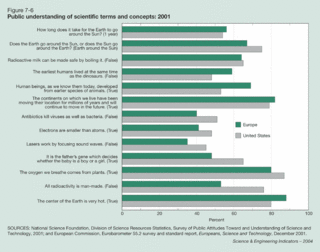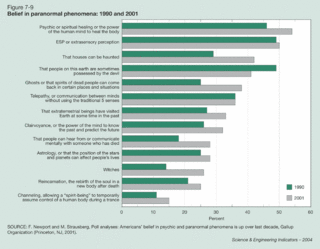That article led me to Public Knowledge About Science and TechnologyHe had firsthand experience with local school issues in the 1980's, when he was a young father living in DeKalb, Ill., and teaching at Northern Illinois University. The local school board was considering closing his children's school, and he attended some board meetings to get an idea of members' reasoning. It turned out they were spending far more time on issues like the cost of football tickets than they were on the budget and other classroom matters. "It was shocking," he said.
So he and some like-minded people ran successfully for the board and, once in office, tried to raise taxes to provide more money for the classroom. They initiated three referendums; all failed. Eventually, he gave up, and his family moved away.
"This country cannot finance good school systems on property taxes," he said. "We don't get the best people for teaching because we pay so little. For people in the sciences particularly, if you have some skill, the job market is so good that teaching is not competitive."
Scientific literacy in the United States (and in other countries) is fairly low. (Scientific literacy is defined here as knowing basic facts and concepts about science and having an understanding of how science works.) The majority of the general public knows a little but not a lot about science. For example, most Americans know that the Earth travels around the Sun and that light travels faster than sound. However, few know the definition of a molecule. In addition, most Americans are unfamiliar with the scientific process.[21]The report also cites Robert L. Park, like me. Anyway, it's interesting that in many ways Europeans are more ignorant than Americans.
Neither Americans nor Europeans got high marks in a 2001 quiz designed to test their knowledge of science. Both groups were asked 13 questions. On average, Americans answered 8.2 questions correctly, compared with 7.8 for Europeans.[22] Americans scored higher than Europeans on seven of the questions. (click on figure below)
Response to one of the questions, "human beings, as we know them today, developed from earlier species of animals," may reflect religious beliefs rather than actual knowledge about science. In the United States, 53 percent of respondents answered "true" to that statement in 2001, the highest level ever recorded by the NSF survey. (Before 2001, no more than 45 percent of respondents answered "true.") The 2001 result represented a major change from past surveys and brought the United States more in line with other industrialized countries about the question of evolution.During most of the 20th century, probably the most contentious issue related to the teaching of science has been whether and how evolution is to be taught in U.S. public school classrooms.[23]
Neither the U.S. survey nor the Eurobarometer has shown much change in the public's level of knowledge about science, with one exception: the number of people who know that antibiotics do not kill viruses has been increasing. In 2001, for the first time, a majority (51 percent) of U.S. respondents answered this question correctly, up from 40 percent in 1995. In Europe, 40 percent of respondents answered the question correctly in 2001, compared with only 27 percent in 1992.[24]
Surveys also indicate that the American public lacks an appreciation of basic statistical concepts and terminology. If statistics were confined to academic journals and textbooks, this finding would be of limited interest. But daily newspapers and even television newscasts rely on tables and charts to illustrate all kinds of trends. (See sidebar, "Understanding Statistics.")
NSF surveys have asked respondents to explain in their own words what it means to study something scientifically. Based on their answers, it is possible to conclude that most Americans (two-thirds in 2001) do not have a firm grasp of what is meant by the scientific process.[27] This lack of understanding may explain why a substantial portion of the population believes in various forms of pseudoscience.Most Americans are probably not technologically literate. They have little conception of how science, technology, and engineering are related to one another, and they do not clearly understand what engineers do and how engineers and scientists work together to create technology....Although discussions of technological literacy imply agreement about the definition of technology, many people define technology far too narrowly. Their definition is usually restricted to computers and the Internet.[30]
Belief in pseudoscience is relatively widespread.For example, at least a quarter of the U.S. population believes in astrology, i.e., that the position of the stars and planets can affect people's lives. Although the majority (56 percent) of those queried in the 2001 NSF survey said that astrology is "not at all scientific," 9 percent said it is "very scientific" and 31 percent thought it is "sort of scientific"
Belief in astrology is more prevalent in Europe, where 53 percent of those surveyed thought it is "rather scientific" and only a minority (39 percent) said it is not at all scientific (European Commission 2001). Europeans were more likely to say that astrology is scientific than to say the same about economics: only 42 percent of those surveyed thought that economics was scientific.In the United States, skepticism about astrology is strongly related to level of education: 74 percent of college graduates said that astrology is "not at all scientific," compared with 45 percent of those with less than a high school education and 52 percent of those who had completed high school but not college. In Europe, however, respondents with college degrees were just as likely as others to claim that astrology is scientific.
Europeans were more likely than Americans to agree that "some numbers are particularly lucky for some people." The percentages were 46 percent and 32 percent, respectively.
Surveys even show increasing belief in pseudoscience (Newport and Strausberg 2001). Of the 13 paranormal phenomena included in a periodically administered Gallup survey, belief in 8 increased significantly between 1990 and 2001, and belief in only 1 (devil possession) declined. Belief in four of the phenomena (haunted houses, ghosts, communication with the dead, and witches) had double-digit percentage point increases between 1990 and 2001[33](see figure below)
CORNELIA DEAN's article also notes
The National Science Foundation is recasting its survey operations, so Dr. Miller is continuing surveys for other clients.I wonder if they're going to start treating creationism as science.


No comments:
Post a Comment